
Continuing with our 2022 theme of Black Men in White Coats, we are featuring Dr. Ben Carson for the month of April.
Ben Carson is considered a pioneer in the field of neurosurgery and recognized worldwide.
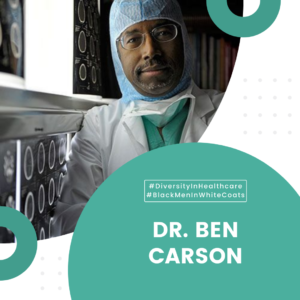
Growing up in a single-parent home in Detroit, Carson graduated high school with a full scholarship to Yale University. He graduated from the University of Michigan Medical School in 1977 and was then accepted by the Johns Hopkins University School of Medicine neurosurgery program, completing his residency in 1983.
Dr. Carson was appointed director of pediatric neurosurgery at Johns Hopkins Children’s Center in 1984 at age 33, then the youngest chief of pediatric neurosurgery in the United States.
In 1987, at 35, he received global acclaim as lead neurosurgeon in the separation of conjoined twins joined at the back of the head. It was the first successful operation of its kind. Additional accomplishments include performing the first successful neurosurgical procedure on a fetus inside the womb, developing new methods to treat brain-stem tumors, and revitalizing hemispherectomy techniques for controlling seizures.
Upon retirement in 2013, he was professor of neurosurgery, oncology, plastic surgery, and pediatrics at the Johns Hopkins School of Medicine. After retiring from medicine Dr. Carson ran for president in 2016, and served as the U.S. secretary of Housing and Urban Development (HUD) under President Trump (2017–2021).
Dr. Carson has received numerous honors for his neurosurgery work, including the Presidential Medal of Freedom in 2008 and election into the National Academy of Medicine in 2010.
Elizabeth Fee, PhD, was an influential historian of science, medicine, and public health.
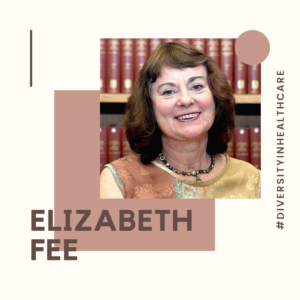
Dr. Fee began teaching at the State University of New York at Binghamton and was extremely popular as a scholar of science and medical history, as well as new and controversial courses in human sexuality.
From 1974 to 1995, Dr. Fee was a professor at the Johns Hopkins School of Hygiene and Public Health (now Bloomberg School). She worked in departments including health humanities, international health, and health policy. During her tenure at Johns Hopkins, Dr. Fee wrote a history of the School of Public Health, Disease and Discovery: A History of the Johns Hopkins School of Hygiene and Public Health, 1916–1939. This is considered the first “biography” of the first school of public health, and it documented power networks in a supposedly technocratic field.
Baltimore is also where Dr. Fee met and fell in love with her lifetime partner and wife, Mary Garafolo, an artist and a nurse. They married in Vancouver, Canada, in 2005.
Dr. Fee joined the National Library of Medicine (NLM) from 1995 to 2018 as Chief of the NLM History of Medicine Division. She oversaw moves to restructure the organization around three sections: Rare Books and Early Manuscripts, Images and Archives, and Exhibitions. She was appointed Chief Historian of the National Library of Medicine in 2011.
Over the course of her entire career, Dr. Fee authored, co-authored, edited, or co-edited nearly thirty scholarly books and hundreds of articles, on topics as varied as the racialized treatment of syphilis, the history of the toothbrush, and bioterrorism. She became particularly well known for her work to document and analyze the history of HIV/AIDS. Dr. Fee coedited two groundbreaking volumes on AIDS, as it was becoming a global modern plague: AIDS: The Burden of History (1988) and AIDS: The Making of a Chronic Disease (1992). Her work informed scholarship on lesbian, gay, bisexual, transgender and queer health and wellbeing.
Shortly before her death Dr. Fee retired to become an independent researcher in 2018. She died from complications of amyotrophic lateral sclerosis (ASL) in October 2018.
Info sources: Elizabeth Fee (The Lancet), Elizabeth Fee (1946-2018) (AJPH), and NLM Mourns the Loss of Elizabeth Fee, PhD, former Chief of the NLM History of Medicine Division (NLM).
Photo source: The Lancet via: https://doi.org/10.1016/S0140-6736(18)32832-0
Mary Eliza Mahoney was the first African American woman to complete nurse’s training in the United States, and an active organizer among African American nurses.
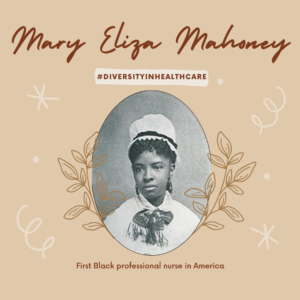 Born in Boston in 1845 to freed slaves, Mahoney knew early on that she wanted to become a nurse; however, Black women in the 19th century often had a difficult time becoming trained and licensed nurses. Nursing schools in the South rejected applications from African American women, whereas in the North, though the opportunity was still severely limited, African Americans had a greater chance at acceptance into training and graduate programs.
Born in Boston in 1845 to freed slaves, Mahoney knew early on that she wanted to become a nurse; however, Black women in the 19th century often had a difficult time becoming trained and licensed nurses. Nursing schools in the South rejected applications from African American women, whereas in the North, though the opportunity was still severely limited, African Americans had a greater chance at acceptance into training and graduate programs.
At the age of 18, she decided to pursue a career in nursing, working at the New England Hospital for Women and Children. The NEHWC became the first institution to offer a program allowing women to work towards entering the healthcare industry, which was predominantly led by men. Despite the NEHWC’s progressiveness, Mahoney worked there as a cook, maid, and washerwoman for 15 years before she was admitted as a student.
In 1878, at age 33, she was accepted in that hospital’s nursing school, the first professional nursing program in the country. Mahoney graduated in 1879 as a registered nurse. Out of a class of 42 students, she and three white women were the only ones to receive their degree – the first Black woman to do so in the United States.
After receiving her nursing diploma, Mahoney worked for many years as a private care nurse, earning a distinguished reputation. She worked for predominantly white, wealthy families and the majority of her work was with new mothers and newborns. Families who employed Mahoney praised her efficiency in her nursing profession. Mahoney’s professionalism helped raise the status and standards of all nurses, especially minorities. During the early years of her employment, African American nurses were often treated as if they were household servants rather than professionals. Mahoney refused to take her meals with household staff to further dismiss the relation between the professions. As Mahoney’s reputation quickly spread, she received private-duty nursing requests from patients in states in the north and along the south east coast.
In 1896 Mahoney became one of the first black members of the organization that later became the American Nurses Association (ANA). When that later organization proved slow to admit black nurses, Mahoney strongly supported the establishment of the National Association of Colored Graduate Nurses (N.A.C.G.N.), and delivered the welcome address at that organization’s first annual convention, in 1909. In her speech, she recognized the inequalities in her nursing education, and in nursing education of the day. The NACGN members gave Mahoney a lifetime membership in the association and a position as the organization’s chaplain.
In retirement, Mahoney was still concerned was deeply concerned with women’s equality and a strong supporter of the movement to gain women the right to vote. When that movement succeeded with the passage of the Nineteenth Amendment in 1920, she was among the first women in Boston to register to vote — at the age of 76.
Mahoney contracted breast cancer in 1923 and died in 1926. In 1936, the N.A.C.G.N. established an award in her honor (later continued by the A.N.A.) to raise the status of black nurses. She was inducted into the A.N.A.’s Hall of Fame in 1976.
Information and photo sources:
https://www.womenshistory.org/education-resources/biographies/mary-mahoney
https://www.pbs.org/wgbh/americanexperience/features/partners-african-american-medical-pioneers/
Helen Rodríguez Trías was a pediatrician, educator and women’s rights activist. She was the first Latina president of the American Public Health Association (APHA), a founding member of the Women’s Caucus of the APHA, and a recipient of the Presidential Citizens Medal. She is credited with helping to expand the range of public health services for women and children in minority and low-income populations in the United States, Central and South America, Africa, Asia, and the Middle East.
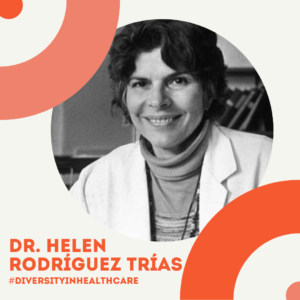 Born in New York in 1929, Helen Rodríguez spent her early years in Puerto Rico, returning to New York with her family when she was 10. Growing up as a Puerto Rican in New York City, she experienced racism and discrimination first-hand. Rodriguez-Trias earned her BA degree from the University of Puerto Rico in 1957 where she became a student activist on issues such as freedom of speech and Puerto Rican independence. She then entered the University of Puerto Rico’s school of medicine and obtained her medical degree in 1960. Rodriguez-Trias chose medicine because it “combined the things I loved the most, science and people”
Born in New York in 1929, Helen Rodríguez spent her early years in Puerto Rico, returning to New York with her family when she was 10. Growing up as a Puerto Rican in New York City, she experienced racism and discrimination first-hand. Rodriguez-Trias earned her BA degree from the University of Puerto Rico in 1957 where she became a student activist on issues such as freedom of speech and Puerto Rican independence. She then entered the University of Puerto Rico’s school of medicine and obtained her medical degree in 1960. Rodriguez-Trias chose medicine because it “combined the things I loved the most, science and people”
During her residency at the University Hospital in San Juan, she established the first center for the care of newborn babies in Puerto Rico. Under her direction, the hospital’s death rate for newborns decreased 50 percent within three years.
When she returned to New York in 1970, Dr. Rodriguez-Trias decided to work in community medicine. After attending a conference on abortion at Barnard College in 1970, she focused on reproductive rights. Throughout the 1970s, Dr. Rodriguez-Trias was an active member of the women’s health movement. She was inspired by “the experiences of my own mother, my aunts and sisters, who faced so many restraints in their struggle to flower and reach their own potential.”
Rodriguez-Trias joined the effort to stop sterilization abuse. Poor women, women of color, and women with physical disabilities were far more likely to be sterilized than white, middle-class women. Rodriguez-Trias was a founding member of both the Committee to End Sterilization Abuse and the Committee for Abortion Rights and Against Sterilization Abuse, and testified before the Department of Health, Education, and Welfare for passage of federal sterilization guidelines in 1979. The guidelines, which she helped draft, require a woman’s written consent to sterilization, offered in a language they can understand, and set a waiting period between the consent and the sterilization procedure.
Rodriguez-Trias was also a founding member of both the Women’s Caucus and the Hispanic Caucus of the American Public Health Association and the first Latina to serve as president. Toward the end of her life she said, “I hope I’ll see in my lifetime a growing realization that we are one world. And that no one is going to have quality of life unless we support everyone’s quality of life…Not on a basis of do-goodism, but because of a real commitment…it’s our collective and personal health that’s at stake.”
In January 2001 she received a Presidential Citizen’s Medal for her work on behalf of women, children, people with HIV and AIDS, and the poor. Helen Rodriguez-Trias died of complications from cancer in December, 2001.
Information and photo source: https://cfmedicine.nlm.nih.gov/physicians/biography_273.html
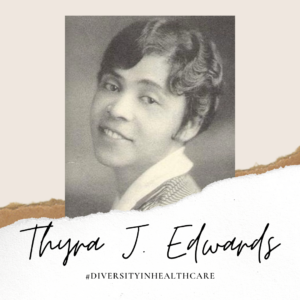
Thyra Johnson Edwards was an American educator, journalist, labor activist, and social worker.
Thyra J. Edwards was born in 1897 in Wharton, Texas. Her grandparents were born enslaved Africans, who escaped from Missouri to Illinois with the help of the Underground Railroad.
Edwards started her career in Houston as a school teacher, eventually moving to Gary, Ind., and Chicago, where she was employed as a social worker, and later moved to New York to work as a journalist. She combined her social work and interest in international affairs, gaining worldwide notoriety for her activism.
Edwards continually looked for places for Black women to be activists in the international community. She was a teacher, journalist, lecturer and social worker, who took an interest in child welfare, even founding her own children’s home. She was a strong advocate for women’s rights, a labor organizer, union publicist, peace and civil rights activist, and a Pan-Africanist.
Thyra Edwards believed that social workers should advocate on behalf of disadvantaged and at-risk populations; focus on issues and problems specifically affecting the well-being of women; and demonstrate the ability to work with diverse populations.
The link between the plight of blacks throughout the world was a cornerstone of her professional philosophy. She worked with people of all races and nationalities during a time when the social work profession was segregated.
It was that viewpoint that attracted her to the Communist Party while she was living in New York in the 1930s. Edwards publicly supported the Loyalists in the Spanish Civil War and used her role as a correspondent to travel to Europe, Mexico, and the Soviet Union. Her activities with the U.S. Communists drew the attention of the FBI and she was monitored by U.S. government intelligence organizations until her death in 1953 at the age of 55.
Sadly, although Edwards was a social work pioneer, she is virtually unknown today in social work.
Info sources: https://www.nabsw.org/page/SocialWork
https://www.blackpast.org/african-american-history/edwards-thyra-j-1887-1953/#sthash.aHDnan4Q.dpuf
Photo source: https://www.nabsw.org/page/SocialWork
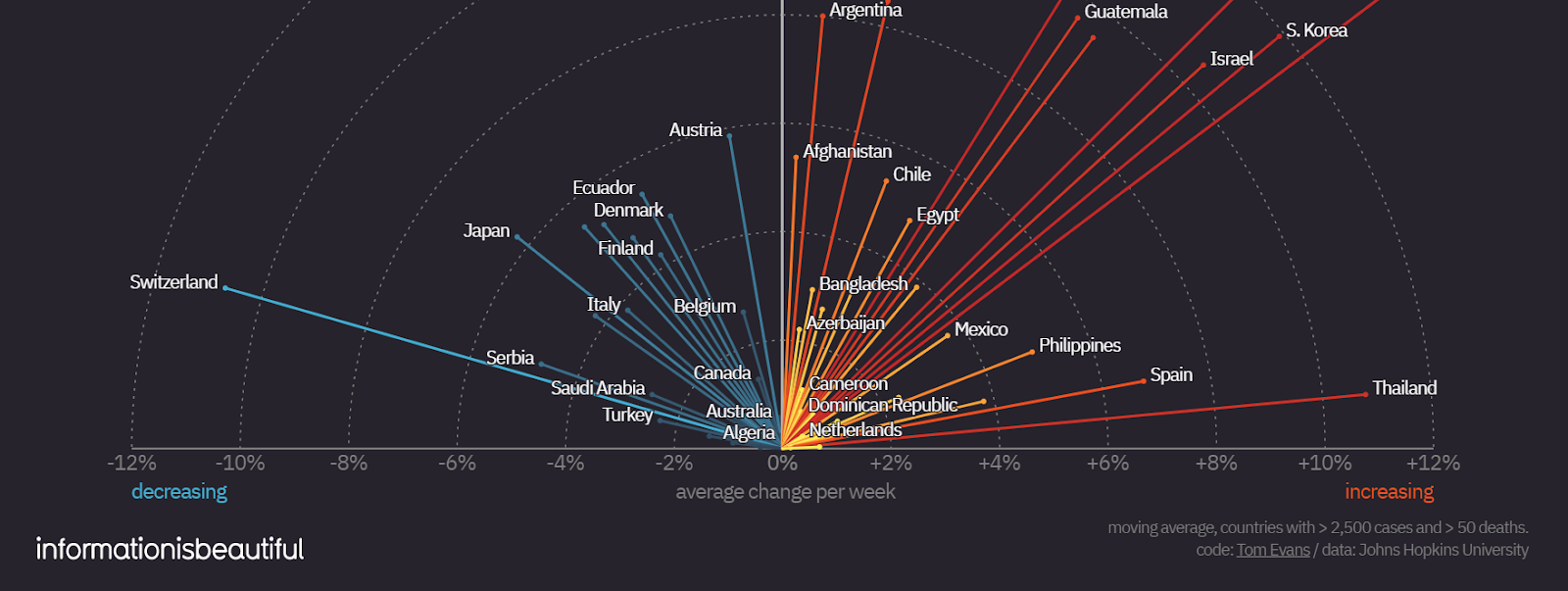
The Covid-19 pandemic has mobilized researchers around the world, particularly those engaged in health sciences and adjacent fields. The output of new preliminary research, trials, Covid-related data and code, as well as tools for visualizing and analyzing these materials, can be overwhelming. The following list of online venues that are hosting and curating Covid-related research and data is not intended to be comprehensive, but is a starting point for those who are engaged in this work, those who have an interest in initiating Covid-related research, or those who may be planning to use these materials in the classroom. With a broad variety of new and interdisciplinary research emerging by the hour, UH Libraries can help you identify, collect, organize research data, as well as archive and share the research data you generate, at the start of a project and at any phase along the way.
Federal repositories for COVID-19 data
Open-Access Data and Computational Resources to Address COVID-19
From the NIH, Office of Data Science Strategy. “Covid-19 open-access data and computational resources are being provided by federal agencies, including NIH, public consortia, and private entities. These resources are freely available to researchers, and this page will be updated as more information becomes available.”
Covid-19 Secondary data and statistics
CDC collection of selected secondary data and statistics sources to help researchers find data on Covid-19 (2019 Novel Coronavirus). Materials listed in these guides are selected to provide awareness of quality public health literature and resources.
Coronavirus (Covid-19) Consumer Complaint Data
The FTC publishes updated coronavirus-related complaint data each weekday based on fraud, do not call, identity theft, and other reports consumers submit to the Consumer Sentinel Network via Complaint Assistant. The aggregated data begins January 1, 2020 and runs to the current date.
Covid-19 Demographic and Economic Resources
The Covid-19 Hub presents selected Census Bureau demographic and economic data to help guide decision making during the Covid-19 pandemic. The data are presented in interactive maps and downloadable resources that users can directly incorporate into their research and data products.
General Data Repositories for Covid-19 data
Dimensions Covid-19 publications, data sets, clinical trials
Dimensions, the sister company to the open data repository Figshare, is a scholarly database that includes awarded grants, patents, and clinical trials alongside publication and Altmetric attention data. Updated daily, this spreadsheet provides access to content from Dimensions.ai that includes a global body of publications, datasets, clinical trials, and grants.
Github Topic for Covid-19
Github is an open community for software and code development, collaboration, and sharing. Commonly, subjects with heavy interest and focus are compiled as a Topic. This Github topic provides a compilation of public repositories that contain code focused around research and awareness of the virus.
Zenodo Coronavirus Disease Research Community – COVID-19
Zenodo is an open access, open source, international “catch-all” repository that was founded by CERN and the OpenAire Project in 2013. Zenodo allows users to create communities of research and sharing within the platform. This community collects research outputs relevant to the Coronavirus Disease (Covid-19) or the SARS-CoV-2. Scientists are encouraged to upload their outcome in this collection to facilitate sharing and discovery of information.
Harvard Dataverse – COVID-19 Data Collection
Harvard Dataverse is a free data repository open to all researchers from any discipline both inside and outside of the Harvard community. This is a general collection of Covid-19 data deposited in the Harvard Dataverse. Researchers who deposit their related data into Harvard Dataverse will have the content linked to this collection, to increase discoverability of their data.
Research Repositories for Covid-19 Literature
LitCovid
LitCovid is a curated hub for tracking up-to-date and peer-reviewed scientific literature from PubMed about the 2019 novel Coronavirus, providing a central access point to relevant articles.
CORD-19
Covid-19 Open Research Dataset allows you to search scholarly articles, including over 13,000 with full text, about Covid-19 and the coronavirus family of viruses for use by the global research community.
Covid-19 SARS-CoV-2 preliminary research posted to medRxiv and bioRxiv
An up-to-the-minute collection of Covid-19 SARS-CoV-2 preliminary findings posted to medRxiv and bioRxiv, the two primary preprint servers for biologists, clinicians, and other health science researchers. Note that both medRxiv and bioRxiv receive many new papers on coronavirus SARS-CoV-2 daily, all of which undergo a screening process, but these are preliminary reports and have not been peer reviewed.
Tools for Covid-19 Visualization
Coronavirus world map and US map
Coronavirus world map and US map from John Hopkins University. The interactive world map gives you confirmed cases by country, region, and global death and recoveries. The US map breaks down to the county level and is updated daily.
Coronavirus infographic datapack
Coronavirus infographic datapack from information is beautiful contains a variety of visualizations related to Covid-19, such as infection trajectories, rising and falling of cases and deaths, connections with existing conditions.
CDC graphics
CDC provides graphics associated with Covid-19, including mortality and rates of hospitalization.
Coronavirus tracker by Tableau
Coronavirus tracker provided by Tableau visualizes Johns Hopkins University data to help you stay on top of key Covid-19 metrics, including totals, the spread of Covid-19, and outbreaks around the world. This dashboard will be updated daily.
IHME Covid-19 projections
Covid-19 projections created by the Institute for Health Metrics and Evaluation (IHME) at the University of Washington. It projects daily infections and testing, daily and total death, and hospital resource use in the world and the US. It also breaks down to states to further investigate the trends for specific areas.
These resources are just the tip of the iceberg of what is available. We can also help you navigate beyond the landscape of Covid-19 research. For additional information feel free to consult our research guides for Finding Data and Data Archiving or schedule a consultation.